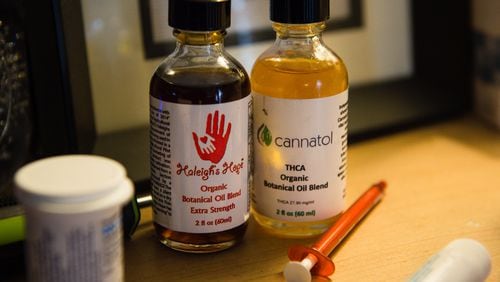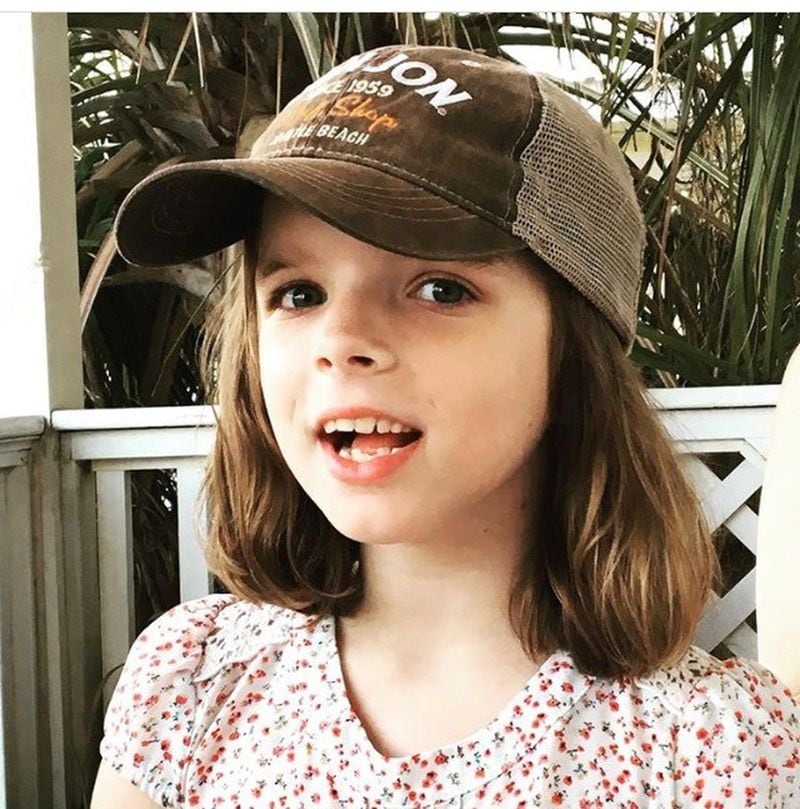Gov. Nathan Deal slammed the door shut on a proposal that would make it vastly easier for Georgians to obtain medical marijuana. But the dejected supporters of the expansion are already plotting ways next year to expand the program after he leaves office.
The governor said in an interview that legislation to legalize in-state cultivation of medical marijuana needed more safeguards to prevent abuse, and he urged supporters to appeal to Congress to change the law that makes it illegal to grow the drug and transport it across state lines.
Asked whether he would support the legislation this year, Deal answered without hesitation: “No.”
It was a bitter development for state Rep. Allen Peake, who wrote the state's medical marijuana law, and the families of children suffering from debilitating diseases who have lobbied each year at the Capitol to make it easier to obtain the drug.
Peake said that he was "disappointed but not surprised" by Deal's decision to oppose his measure, House Bill 645, that would allow a limited form of cultivation and manufacturing of the drug. But he said he's already at work clearing the way for an expansion when Deal's term expires.
“I guess it will be an issue that the next governor will have to decide,” he said, “and I fully expect it to be a huge issue in the upcoming election.”
For now, though, the decision leaves the future of the state’s medical marijuana program in doubt. Created in 2015, the program made it legal for people suffering from cancer and more than a dozen other illnesses to possess small amounts of cannabis oil if a physician signs off.
The state estimated hundreds of thousands of residents could be eligible for the drug, and at least 17 Georgia families have temporarily moved to places such as Colorado where the cannabis oil is legal.
Only about 3,500 Georgians have signed up for the program, in part because of tremendous logistical and legal hurdles for patients who want to get the drug.
It’s illegal to cultivate marijuana in Georgia, which means families have to rely on benefactors or trek to states that have legalized the drug for medical purposes. That makes travel a tricky prospect, since federal law bans transporting the drug across state lines and bars possessing it.
The governor nodded to those pressures in his interview, saying he’s uncomfortable with pursuing state policy that relies on knowingly skirting federal law.
“Even though they turn their head the other way and don’t enforce those restrictions in certain circumstances, that’s not a very good way of doing business,” Deal said. “We should not have to go around and sneak around to avoid the federal government’s laws and rules.”
‘What is the point?’
His words quickly echoed under the Gold Dome. House Speaker David Ralston said he heard Deal's concerns "loud and clear" and said advocates should focus instead on the gubernatorial contenders.
“The elephant in the room is the federal prohibition,” Ralston said. “I think we’re building up expectations in people’s minds that want this treatment to keep pretending like we’re moving forward.”
Peake said he’s pushing forward with crafting his legislation so that the next governor — regardless of party — can be ready to expand the program.
His party is largely split on the idea. At GOP forums, Lt. Gov. Casey Cagle, Georgia Secretary of State Brian Kemp and former state Sen. Hunter Hill have each signaled their opposition to in-state cultivation.
Two other contenders, businessman Clay Tippins and state Sen. Michael Williams, are advocates for expansion. Tippins said more patients should be able to access "valid treatments that are already legal for use," while Williams invokes a deeply personal story in explaining his support.
He said it’s rooted in his father’s diagnosis with severe bipolar disorder after he served in the Vietnam War. His father committed suicide when Williams was 14, and the senator said that if his father were alive today, he would have likely been diagnosed with post-traumatic stress disorder.
“Legalized in-state cultivation and distribution will ensure safe access for suffering patients,” Williams said. “Until medical cannabis oil is readily available for patients with qualifying conditions, what is the point of legalizing it?”
The two Democratic candidates in the race, former state legislators Stacey Abrams and Stacey Evans, also back the idea. Abrams said Tuesday at a press conference that in-state cultivation should be viewed as a way to fight prescription drug abuse.
“I believe in the expansion of medical marijuana because it’s an important step to combat the opioid crisis,” said Abrams, whose platform also calls for lawmakers to decriminalize possession of small amounts of marijuana.
While in-state marijuana cultivation isn't moving forward this year, lawmakers are still considering a proposal, House Bill 764, to add post-traumatic stress disorder and chronic pain to the list of conditions the state recognizes as being treatable by medical marijuana.
“I can’t get the the medicine I want and need from my state,” Joshua Littrell, a U.S. Air Force veteran who served in Iraq, said during testimony Tuesday to the House Medical Cannabis Working Group. “It helps and it works.”
‘A lot of confusion’
The program’s supporters are backed by recent surveys that show widespread approval for expansion.
An Atlanta Journal-Constitution poll published in January showed 77 percent of registered Georgia voters were comfortable with in-state cultivation. A slim majority also supported legalizing marijuana for recreational use.
The families of children suffering from diseases have lobbied lawmakers for years with emotional stories that have brought hardened politicians to tears.
To Beckee Brown Lynch, cannabis oil is nothing short of a lifesaver for her 10-year-old daughter Norah. The child once suffered frequent and devastating seizures. After one particularly brutal seizure that threatened her life, her family turned to cannabis oil.
The drug worked like a charm, and the number and severity of Norah’s seizures plunged. But a stubborn problem remains.
“We don’t know from one month to the next if we’re going to have her medicine,” said Lynch, a mother of six from Snellville who receives the drug for her daughter through a benefactor.
Opponents of in-state cultivation often bring up a slippery slope argument, worrying that expanding the law could eventually pave the way to legalization of recreational use of marijuana. And Deal said a new federal law to “give the states more flexibility” on medical marijuana could clarify the situation.
“There’s a lot of confusion and overlay of federal rules and laws,” he said, “and that needs to be the starting point of doing something about it.”
That type of overhaul could take years to push through a gridlocked Congress. Lynch and others plan to focus their energy in Atlanta — even if it takes another year.
“Now we have an answer. We found out what works. And we have no way to get it,” she said. “It’s like dangling a carrot in front of someone and saying, ‘We’re going to give you a solution but not the ability to buy it.’ ”
Never miss a minute of what’s happening in Georgia Politics. Subscribe to PoliticallyGeorgia.com.










